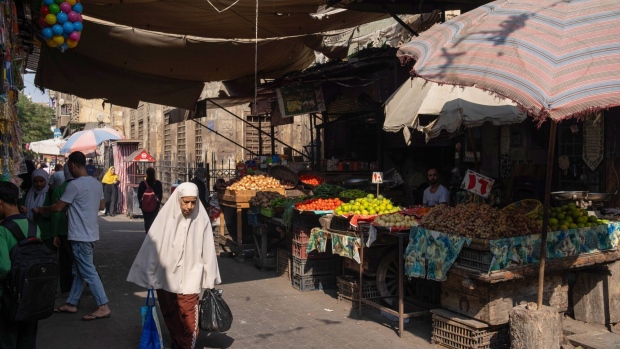Jan 10, 2024
Egypt Inflation Ended Year on Downswing That Now Hinges on Pound
, Bloomberg News

(Bloomberg) -- Egyptian inflation slowed for the third month in a row and looks set to decelerate further unless authorities move to weaken the pound again in the coming weeks.
Consumer prices in urban parts of the country grew an annual 33.7% in December, down from 34.6% the previous month and the slowest since May, according to data published on Wednesday. Increases in the cost of food and beverages, the largest single component of the inflation basket, fell to 60.5%.
The deceleration from last year’s record of 38% has gone uninterrupted, adding to signs that inflation pressures are relatively contained a month after a presidential ballot in which Abdel-Fattah El-Sisi won a third term. Egypt’s ability to put the brakes on prices may determine the timing of what would be its fourth devaluation since early 2022, a decision certain to pile more pain on households in the Middle East’s most populous nation.
A flexible exchange rate is a key plank of a $3 billion rescue package secured from the International Monetary Fund more than a year ago as Egypt descended into its worst economic crisis in decades. The government is now trying to increase the size of the program, whose review has been repeatedly delayed.
The pound’s official rate has been steady at 30.9 per dollar for months. But it’s more than a third weaker on the black market, where it’s trading at around 50.
Read More: Cash-Strapped Egypt Eyes Expanded IMF Loan Now Election Is Over
Apart from the risks of further depreciation, inflation will likely come under pressure from sharp price increases announced days ago for key services like electricity and the metro.
Higher electricity tariffs are set to add 0.7 percentage point to monthly inflation in January, according to Cairo-based Naeem Brokerage, with an additional indirect impact the following month. Monthly inflation was 1.4% in December, compared with 1.3% in November.
Read More: Egypt Starts 2024 Hiking Prices, With Sights on IMF Boost
IMF Managing Director Kristalina Georgieva suggested last month that the government’s priority should be lowering inflation rather than focusing on the exchange rate. As recently as in October, she warned Egypt would “bleed” reserves until it devalues.
A decision to allow for a weaker pound will probably be accompanied by a sharp hike in interest rates that are now deeply negative when adjusted for inflation. The central bank has been on pause since an increase in August and next plans to review policy on Feb. 1.
Inflation will likely continue slowing “considerably” throughout 2024, according to Farouk Soussa, an economist at Goldman Sachs Group Inc. Supply shocks are expected to taper off, while favorable base effects will contribute significantly to easing pressures in the first quarter, he said.
--With assistance from Tarek El-Tablawy and Abdel Latif Wahba.
©2024 Bloomberg L.P.








